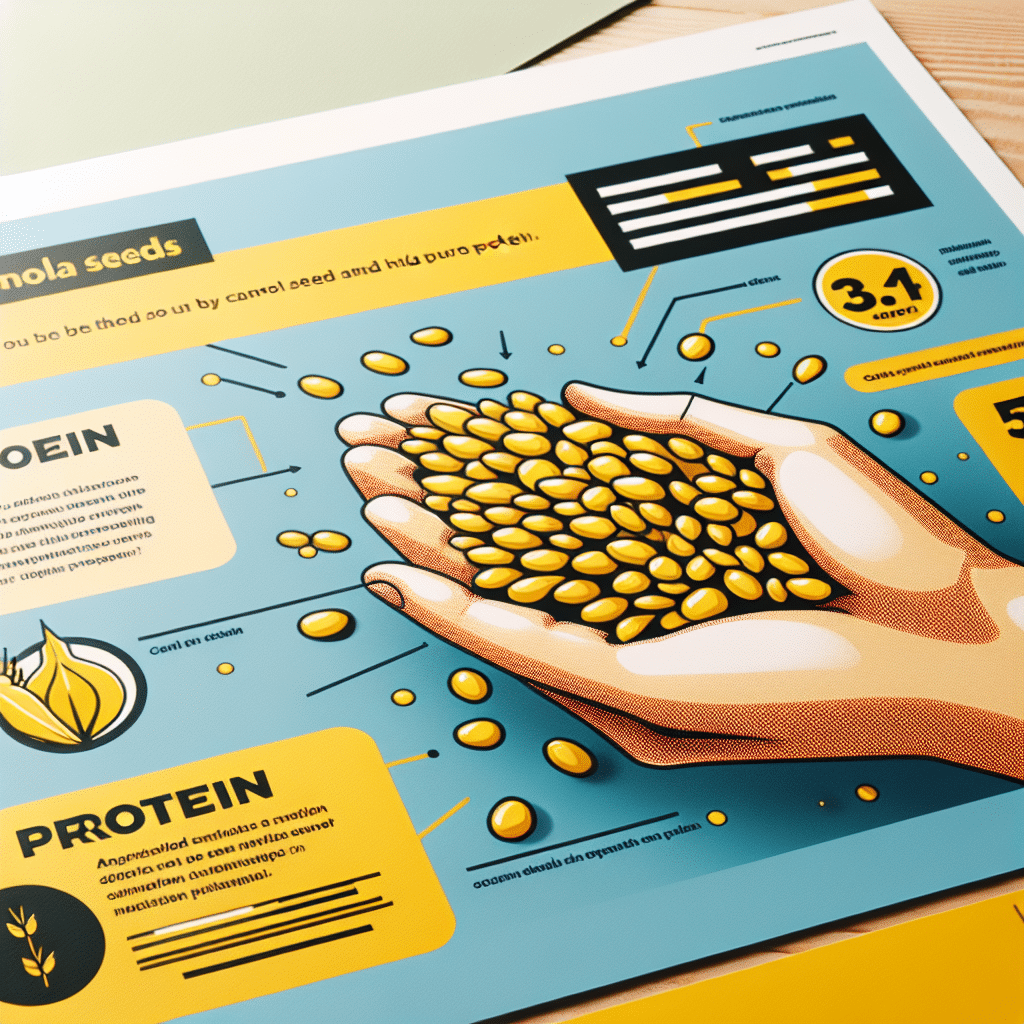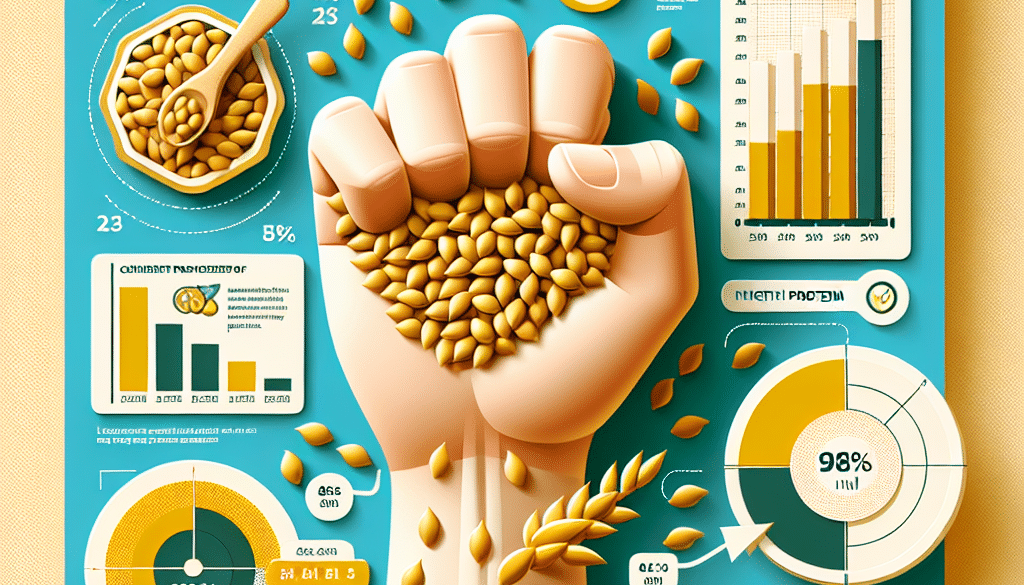Is Canola Seed High In Protein?
-
Table of Contents
- Canola Seed Protein Content: A Comprehensive Analysis
- Understanding Canola Seed Composition
- Protein Content in Canola Seed
- Comparison with Other Protein Sources
- Canola Protein in Human Nutrition
- Canola Protein in Animal Feed
- Canola Protein Extraction and Processing
- Challenges and Considerations
- Case Studies and Research
- Market Potential and Sustainability
- Conclusion: The Future of Canola Protein
- Discover ETprotein’s High-Quality Protein Products
Canola Seed Protein Content: A Comprehensive Analysis

Canola seed, derived from a variety of rapeseed, is a crop that has gained significant attention in the agricultural and nutritional sectors. Known primarily for its oil, canola has also sparked interest for its protein potential. This article delves into the protein content of canola seed, comparing it to other protein sources, and exploring its viability as a protein-rich food ingredient.
Understanding Canola Seed Composition
Canola seed is composed of oil, protein, and a small fraction of carbohydrates and fiber. The oil content, which is the primary product extracted from canola, is typically around 40-43%, leaving the meal after oil extraction with a significant amount of protein.
Protein Content in Canola Seed
After the oil extraction process, canola meal typically contains between 36% to 38% protein, which is relatively high compared to many other plant-based protein sources. However, it’s important to note that the quality of protein is also a critical factor to consider. Canola protein is rich in essential amino acids, particularly sulfur-containing amino acids like methionine and cysteine, which are often limited in plant proteins.
Comparison with Other Protein Sources
When compared to other plant-based proteins, canola meal stands out for its high protein content. For instance, soybean meal, another popular protein source, contains about 46-49% protein, while sunflower seed meal ranges from 28-42% protein depending on the type of sunflower and the dehulling process. Animal-based proteins, such as whey or casein, typically offer higher protein percentages but come with dietary restrictions for some consumers.
- Soybean Meal: 46-49% protein
- Sunflower Seed Meal: 28-42% protein
- Whey Protein: 80-90% protein (concentrate), up to 95% (isolate)
- Casein Protein: 80% protein
Canola Protein in Human Nutrition
Canola protein holds promise for human nutrition due to its balanced amino acid profile. It can serve as an excellent supplement for those looking to increase their protein intake, particularly vegetarians and vegans. Moreover, canola protein is gluten-free and non-GMO, making it suitable for individuals with specific dietary restrictions.
Canola Protein in Animal Feed
Traditionally, canola meal has been used as a protein-rich animal feed, especially for poultry, swine, and cattle. Its high protein content and amino acid profile make it a valuable component in feed formulations, contributing to the growth and health of livestock.
Canola Protein Extraction and Processing
The process of extracting protein from canola involves removing the oil through pressing or solvent extraction, followed by further processing to isolate the protein. Advances in processing technology have improved the efficiency and purity of canola protein isolates, making them more suitable for food applications.
Challenges and Considerations
Despite its potential, there are challenges in promoting canola protein for human consumption. The presence of anti-nutritional factors, such as glucosinolates and phytates, can affect protein digestibility and mineral absorption. However, breeding programs and processing techniques are being developed to reduce these compounds in canola meal.
Case Studies and Research
Several studies have investigated the use of canola protein in food products. For example, research has shown that canola protein can be incorporated into baked goods, meat substitutes, and dairy alternatives without compromising taste or texture. Ongoing research aims to optimize the functionality and palatability of canola protein in various food applications.
Market Potential and Sustainability
The demand for plant-based proteins is on the rise, and canola protein is well-positioned to meet this demand. Its cultivation requires less water and land compared to animal protein sources, making it a more sustainable option. The canola industry is also exploring ways to utilize the entire seed, reducing waste and increasing the value of the crop.
Conclusion: The Future of Canola Protein
Canola seed is indeed high in protein, offering a promising alternative to both animal-based and other plant-based proteins. With its favorable amino acid profile and potential for sustainable production, canola protein could play a significant role in meeting the growing global demand for protein. As research continues to enhance its nutritional profile and functionality, canola protein may become a staple ingredient in a variety of food products.
Discover ETprotein’s High-Quality Protein Products
If you’re interested in exploring high-quality protein options, ETprotein offers a range of organic bulk vegan proteins that cater to diverse dietary needs and industries. Their products, including canola protein, are characterized by a neutral taste, non-GMO, and allergen-free attributes, ensuring that you receive the best in terms of both nutrition and quality.
About ETprotein:
ETprotein, a reputable protein and L-(+)-Ergothioneine (EGT) Chinese factory manufacturer and supplier, is renowned for producing, stocking, exporting, and delivering the highest quality organic bulk vegan proteins and L-(+)-Ergothioneine. They include Organic rice protein, clear rice protein, pea protein, clear pea protein, watermelon seed protein, pumpkin seed protein, sunflower seed protein, mung bean protein, peanut protein, and L-(+)-Ergothioneine EGT Pharmaceutical grade, L-(+)-Ergothioneine EGT food grade, L-(+)-Ergothioneine EGT cosmetic grade, L-(+)-Ergothioneine EGT reference grade and L-(+)-Ergothioneine EGT standard. Their offerings, characterized by a neutral taste, non-GMO, allergen-free attributes, with L-(+)-Ergothioneine purity over 98%, 99%, cater to a diverse range of industries. They serve nutraceutical, pharmaceutical, cosmeceutical, veterinary, as well as food and beverage finished product distributors, traders, and manufacturers across Europe, USA, Canada, Australia, Thailand, Japan, Korea, Brazil, and Chile, among others.
ETprotein specialization includes exporting and delivering tailor-made protein powder and finished nutritional supplements. Their extensive product range covers sectors like Food and Beverage, Sports Nutrition, Weight Management, Dietary Supplements, Health and Wellness Products, and Infant Formula, ensuring comprehensive solutions to meet all your protein needs.
As a trusted company by leading global food and beverage brands and Fortune 500 companies, ETprotein reinforces China’s reputation in the global arena. For more information or to sample their products, please contact them and email sales(at)ETprotein.com today.












